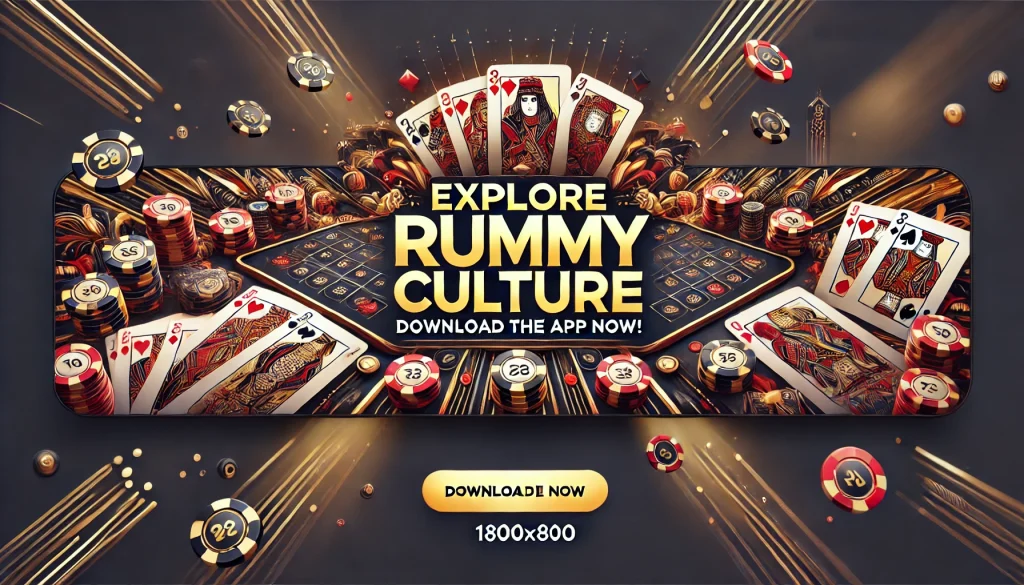
The Complete Guide to Rummy As a card game that has enthralled players for centuries, rummy has a long and diverse history that dates back to the early 1800s. Although the game’s precise beginnings are still a little unclear, it is generally accepted that it developed from earlier card games like the Mexican-originated Conquian. The game saw numerous changes and adaptations during the 1900s as it became more and more popular in the US. Rummy had gained widespread popularity by the 1930s, and several variations, such as Indian and Gin Rummy, had emerged.
Because it combines strategy, skill, and chance, players of all ages and backgrounds can enjoy this game. Numerous regional variations resulted from Rummy’s adaptation to various cultures & tastes as it spread throughout the world. For example, rummy has grown to be a popular game in India and is frequently played at family get-togethers & social events.
Also, the game has made its way online, where players can now play Rummy from the comfort of their homes thanks to online platforms. Its transformation from a straightforward card game to a worldwide sensation demonstrates both its enduring appeal and its capacity to unite people from all walks of life. Rummy is fundamentally a card game in which players use a standard deck of cards to form sets and runs. Players must combine their cards into legal combinations before their rivals do. This is the simple goal.
Each player is dealt a set number of cards at the start of a typical game, usually seven or ten, with the remaining cards forming a draw pile. Before discarding one card from their hand, each player takes a turn drawing cards from the draw or discard pile. Players must choose which cards to keep and which to discard while monitoring the moves of their opponents, which is where the strategic component enters the game. Players must make “melds,” or legitimate combinations, in order to win at rummy.
Three cards of the same rank (a set) or three or more consecutive cards of the same suit (a run) can make up a meld. A player can declare victory once they have successfully formed their melds and have no more unmelded cards in their hand. The scoring system, however, must also be considered by players; points are usually given according to the value of unmelded cards that remain in opponents’ hands after one player leaves. In order to reduce possible losses, players must balance their offensive & defensive moves, which adds another level of strategy. One of the most alluring aspects of rummy is its adaptability, as it has given rise to a wide variety of variants that accommodate varying tastes and ability levels.
Gin Rummy, which is played between two players and stresses fast gameplay & strategic decision-making, is one well-liked variation. The goal of Gin Rummy is to minimize the quantity of unmatched cards in the player’s hands while forming melds. In order to indicate that they think they have fewer unmatched cards overall than their opponent, one player must “knock,” which ends the game. This variation is especially popular because it is fast-paced and encourages fierce competition.
Indian Rummy, which usually uses two decks of cards and can have up to six players, is another popular variation. At least two sequences must be formed by players in this version, with one of them having to be a pure sequence—a run devoid of jokers. A favorite among enthusiasts in India and abroad, Indian Rummy is distinguished by its distinct rules and focus on strategy. Players can always find a version that suits their preferences thanks to additional variations like Oklahoma Rummy and Kalooki, which add distinctive twists and rules.
Rummy tournaments provide an exciting opportunity for players who enjoy competition to show off their skills against other players. From neighborhood get-togethers at community centers to massive online tournaments with competitors from all over the world, these events can take many forms. These tournaments’ formats frequently differ; some might use a round-robin system in which each player competes against every other competitor, while others might use a knockout format in which players are eliminated after losing a predetermined number of games. In addition to improving one’s gameplay, playing rummy tournaments helps players who are passionate about the game bond with one another.
Participant motivation is increased by the fact that many tournaments award cash prizes or trophies to the best performers. These gatherings also frequently include seasoned players who can offer insightful commentary and helpful tips for raising one’s level of play. More players can now participate in this exciting aspect of rummy thanks to the growing competitive scene and the accessibility of both online and offline tournaments. Rummy is a social activity that unites people in a variety of contexts and is more than just a card game.
Rummy is a game that promotes communication and camaraderie, whether it is played at cafes, parties with friends, or family get-togethers. Because of the way the game is designed, players can interact with one another on a personal level and engage in conversation and laughter. Parents teach their children the rules and strategies of Rummy as they grow up, making it a beloved tradition that spans generations in many cultures.
Also, Rummy has been incorporated into popular culture through literature, television, and film. Its representation frequently places an emphasis on themes of wit, strategy, & social interaction, which further cemented its standing as a popular hobby. Online platforms have also influenced this culture by establishing virtual communities where gamers can enjoy their favorite game and make new friends from around the globe. This fusion of history & contemporaryity guarantees that rummy will always be popular and will continue to promote relationships between various social groups.
There are many cognitive advantages to playing rummy that go beyond simple enjoyment. Players must use critical thinking abilities to evaluate their hands and make strategic choices based on the information at hand in order to win the game. Over time, this mental exercise can help with memory retention and problem-solving skills. Rummy also helps players become more foresighted; success depends on being able to predict your opponents’ next moves. These abilities are useful not only in the virtual world but also in real-world scenarios where strategic planning is crucial.
Rummy also helps players interact with one another, which develops social skills. Friendly competition teaches people important lessons about communication, patience, and sportsmanship. In both personal & professional contexts, these interpersonal skills are essential.
Also, the game’s versatility lets users customize their experience to suit their tastes, whether they want lighthearted fun or fierce competition. For these reasons, it’s a great option for anyone wishing to improve their cognitive function while spending time with others. Thanks to mobile applications, playing rummy has never been simpler in the current digital era, enabling players to do so whenever and wherever they choose.
The first step in downloading a rummy app is to go to the app store on your device, which is the Apple App Store for iOS users or the Google Play Store for Android users. Once there, type “Rummy” or “Rummy app” into the search bar. When a list of applications becomes available, take your time reading reviews and ratings to determine which one best fits your needs. Click the download button after choosing an app that you like.
The speed of your internet connection will determine how long this process takes. Open the app after downloading it, then follow any instructions for creating an account or logging in if you already have one. Before beginning to play competitively, new users can become acquainted with the rules through tutorials or practice modes offered by numerous apps. You can interact with players worldwide & fully immerse yourself in the world of online rummy with a few easy steps. There are countless chances for skill development & social interaction when you join the rummy community. Players can discuss tactics, exchange stories, and even set up friendly matches in the forums or chat rooms that are frequently available on online platforms.
By interacting with other enthusiasts, people can develop friendships that go beyond the virtual world and learn from one another. In order to promote involvement & teamwork among members, many communities also hold competitions or events. In addition to online communication, local rummy clubs or meetups offer a great way to meet people who share your interests in person. These events frequently offer both more structured competitions and casual games, enabling players to enjoy the game in a variety of ways. By participating in these communities, whether they be online or offline, players not only improve their gameplay but also add to the lively Rummy culture, guaranteeing that this classic card game will be played for many more generations to come.
Rummy is a complex game that incorporates social interaction, strategy, history, & culture. In summary, it is more than just a card game. Rummy has captured people’s attention from its modest origins to its current position as a worldwide sensation. Rummy undoubtedly occupies a unique place in the world of games, where skill meets chance and friendships are formed over every hand dealt, regardless of whether you are drawn to it for its competitive nature or its capacity to promote interpersonal relationships.





